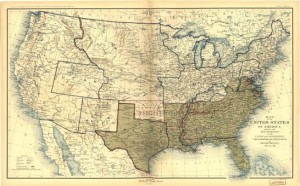 As the spring campaigns move into late May with no significant victories on the part of the Confederacy, the rhetoric over black slavery, the cause of the war as long acknowledged South and North, escalates.
As the spring campaigns move into late May with no significant victories on the part of the Confederacy, the rhetoric over black slavery, the cause of the war as long acknowledged South and North, escalates.
White Baptist leaders in the South, banking on the South’s antebellum foundation of white supremacy, work hard to keep white common folk convinced that African slavery is best for poor whites and blacks alike, rather than wealthy slaveholders only. Amidst growing, if discreet, doubts that the Confederacy will be able to win the war with the abolitionist North, Confederate officials know that they must follow through to the end with their bet on the enslavement of the black race. Confederate army desertions pose a major problem, forcing government and military leaders to walk a fine line between replenishing the ranks and avoiding further alienation of common folk whites who are fed up with fighting what is perceived to be a rich man’s war. White Baptist leaders, long ago co-opted by the South’s slave culture, provide theological cover for prosecuting the war, at all costs, against the evil abolitionist enemy.
But will the heightened efforts of Confederate government officials, military leaders, and Baptist (and other Christian) elites to ensure loyalty to a slave-based society be enough to defeat abolitionism and enshrine African slavery in the South in perpetuity?
For their part, Northern (American) Baptists are convinced that the Confederacy cannot prevail. In their view, the tide has irrevocably turned against the Confederacy and its foundational institution of slavery. The Christian mandate of freedom for all cannot be turned back, nor can the march of democratic freedom as advanced by military might in the fight against the Rebellion.
Today the northern American Baptist Missionary Union convenes for its annual meeting in Philadelphia. Not surprisingly, in the midst of the mission reports war remains uppermost on the minds of many attendees. Anti-slavery sentiment pervades the organization, and delegates issue a strongly-worded war resolution:
Resolved, That we regard the rebellion inaugurated by the Southern States for the purpose of destroying the Union which our fathers founded, and establishing a slaveholders’ confederacy, as utterly causeless and inexcusable—a crime against civilization, humanity, freedom, and God, unparalleled in all centuries.
That we tender to the President and the national authorities the assurance of our confidence and of our sympathy with their efforts to maintain the integrity of the republic; of our prayers for their success; of our readiness to sustain them by the sacrifices of property and life, and of our hearty assent to the policy of conquering disunion by uprooting slavery, its cause.
That we rejoice in the interest and cooperation manifested by the Government with respect to the establishment of schools and Christian institutions throughout the recovered portions of the Southern land, as an evidence of its practical recognition of the Gospel of Christ as the only sure basis, and the best safeguard of national peace and prosperity, and that we offer it our most cordial thanks for the facilities afforded to our own kindred organizations in the prosecution of this momentous work.
That however prolonged may be the conflict, and however great the cost which we may be required to pay, our trust in the final triumph of liberty and righteousness is unshaken, and amid victory and defeat alike, we rest in the conviction that a merciful though chastening Providence will bring forth from the carnage and woe of this civil war a brighter, grander future for our country and the world.
As do many if not most northern Christians, the Baptists gathered today view the abolition of slavery as a moral and religious issue necessary for God’s blessing upon the nation. Thus, despite – or alongside of – Baptists’ historic commitment to church state separation, a sense of civil religion is evident in the discourse.
Confident that the Union and Christian morality will eventually triumph, Baptists of the North hope and pray that the victory will come soon.
Sources: Resolution from the American Baptist Missionary Union, see American Annual Cyclopedia and Register of Important Events of the Year 1864, New York: D. Appleton, 1870, pp. 162-163 (link); The Missionary Jubilee: An Account of the Fiftieth Anniversary of the American Baptist Missionary Union, at Philadelphia, May 24, 25 and 26, New York: Sheldon and Company, 1869 (link); illustration (link)


